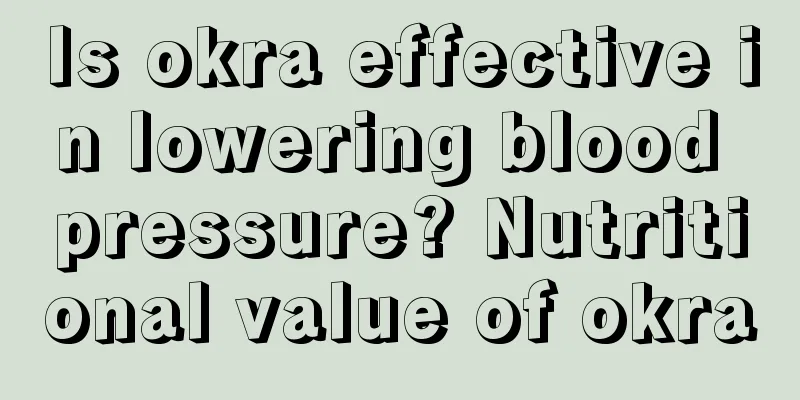Is okra effective in lowering blood pressure? Nutritional value of okra

|
Patients with hypertension are very painful after the onset of the disease. First of all, hypertension will cause dizziness, headache, general fatigue, lack of qi and blood in the body. More serious cases will be accompanied by confusion, sleepiness, and physical weakness. In fact, okra has a certain blood pressure lowering effect in normal times and can be used to make many delicious foods. At the same time, eating more okra can also promote fat decomposition and relieve the aggravation of the disease. Can okra really lower blood pressure? Okra is just a vegetable. If it is used as a substitute for drugs to lower blood pressure, its effect is not obvious. Okra is a vegetable recognized as having high nutritional value. Its potassium content is slightly higher than that of spinach, its calcium content is comparable to that of celery, its vitamin C content is equivalent to that of tomato, its dietary fiber content is twice that of leek, and its vitamin B1 content is higher than that of most vegetables. There are indeed reports that okra extracts have been used to treat diseases such as hyperlipidemia, hypertension and diabetic nephropathy, but this does not mean that eating a few okra occasionally can work wonders. After all, okra is a vegetable and can only serve as an auxiliary treatment. It can never cure all diseases. Therefore, we must have a correct understanding and ability to distinguish such exaggerated propaganda as okra, and we should not over-worship any kind of food. What are the nutritional values of okra 1. Okra contains pectin, galactomannan, etc., which can help digestion, treat gastritis and gastric ulcers, and protect the skin and gastric mucosa. It is known as one of the best health vegetables for humans. 2. Okra is rich in vitamin A, which is an element that can effectively enhance eye health and protect vision. In addition, okra also secretes a kind of mucin, which is very effective in improving stomach conditions, enhancing stomach function and enhancing our appetite. 3. For young and middle-aged people and athletes, okra can eliminate fatigue and quickly restore physical strength. At the same time, the young okra fruit contains a viscous liquid and arabinan, galactan, rhamnan, protein, calcium oxalate, etc. Regular consumption helps digestion, enhances physical strength, protects the liver, and strengthens the stomach and intestines. 4. Okra has a good health care effect on the skin. It also has the effect of enhancing skin whitening and tenderness. This is because okra is rich in vitamin C and soluble fiber. In addition, the trace elements rich in okra are also very effective in preventing and fighting cancer. How to lower blood pressure scientifically Controlling heat and maintaining ideal body weight Overweight and obesity are one of the risk factors for hypertension. Obesity is mainly caused by excessive energy intake and insufficient energy consumption, which leads to excessive accumulation of fat in the body. Hypertensive patients should always monitor their weight changes and keep it at an appropriate stable level. Both low and high weight will be detrimental to health. Low-salt diet Epidemiological surveys have shown that sodium intake is positively correlated with the incidence of hypertension, so salt intake should not be too much. It is generally recommended that people with mild hypertension or a family history of hypertension should control their salt intake to less than 5 grams per day. The salt intake of those with high blood pressure or combined with heart failure should be more strictly restricted, and 1 to 2 grams of salt per day is appropriate. In addition to limiting salt intake, you should also reduce the use of cooking seasonings, such as soy sauce, MSG and other condiments, and eat less various pickled products, such as pickles, bacon, salted fish and other pickled products. Control dietary fat Long-term intake of excessive high-energy, high-fat foods can cause obesity, which in turn can lead to various chronic diseases. Animal fat is high in saturated fatty acids, which can increase cholesterol, easily lead to thrombosis, and increase the incidence of hypertensive stroke. The vast majority of people in my country mainly eat pork, which has a higher fat content than fish and poultry. Therefore, the meat structure dominated by pork should be adjusted, and eating fish should be especially encouraged. The unsaturated fatty acids contained in fish, especially deep-sea fish, have the effect of lowering blood lipids and preventing thrombosis. Vegetable oils are high in unsaturated fatty acids, which can prolong platelet aggregation time, inhibit thrombosis, lower blood pressure, and prevent stroke. Therefore, it is more appropriate to choose vegetable oil as cooking oil. Eat more vegetables and fruits Vegetables and fruits are important sources of vitamins, minerals, dietary fiber and phytochemicals. Studies have found that increasing the intake of vegetables and fruits can not only maintain the health of the body, but also reduce the risk of chronic diseases such as cardiovascular diseases. The daily intake of vegetables should reach at least one pound, with dark vegetables accounting for half of it, and it is best to eat fruit every day. When choosing fruits and vegetables, you can choose more foods rich in vitamin C, such as bell peppers, broccoli, tomatoes, lemons, citrus, kiwis, etc. Studies have found that vitamin C has the function of protecting arterial endothelial cells from damage by harmful substances in the body. Among elderly patients with hypertension, those with the highest vitamin C content in their blood have the lowest blood pressure. Exercise and stay positive Studies have shown that long-term exercise and an optimistic attitude can help lower blood pressure steadily. Patients with hypertension should control the amount of exercise according to the level of their blood pressure, and exercise at a level that makes them comfortable. They should avoid strenuous exercise. If patients with hypertension are often anxious, nervous or angry, it may induce myocardial infarction and stroke. Therefore, patients with hypertension should maintain an optimistic and happy mood, and avoid ecstasy, anger, depression and sadness. |
<<: Can external auditory canal eczema be treated?
>>: How to analyze the results of trace element detection
Recommend
Classification of cardiorenal syndrome
Everyone knows that the heart and kidneys are two...
What to do if bitten by a rat
Rats are very common in our rural areas. Especial...
The most obvious sign of colon cancer
There is usually no obvious sign of colorectal ca...
How to prevent bladder cancer
Prevention is better than cure, and this also app...
Are ovarian tumors generally hereditary?
When someone in the family has an ovarian tumor, ...
How should lung cancer be diagnosed? Clinical diagnostic methods for lung cancer
The treatment of lung cancer is a problem that ma...
Symptoms of renal impairment
Renal function damage means that the patient has ...
Is nasopharyngeal carcinoma highly hereditary?
Is nasopharyngeal cancer hereditary? According to...
Cervical cancer is the natural enemy of women, and it is the natural enemy of "cervical cancer"!
At present, cervical cancer has become a very ser...
How to do bronchogram?
Bronchography is a method of examination. Broncho...
What are the uses of formaldehyde?
When a new house is renovated, people are worried...
How to treat the precursors of myocardial infarction
If we want to effectively avoid and reduce the ha...
What should I do if my legs are dry and flaky
Dry skin is a very difficult problem for people t...
How painful is a normal uterine curettage
Curettage is a common gynecological surgery. Many...
What factors affect the life expectancy of esophageal cancer
Eating habits, long-term smoking and drinking str...









